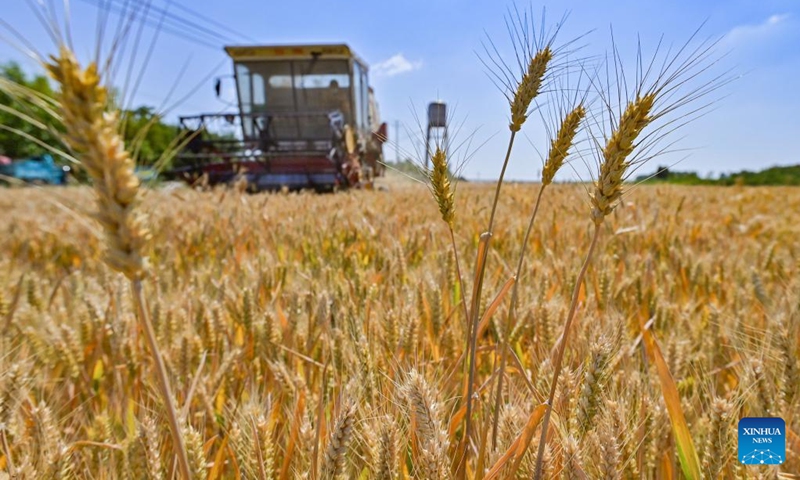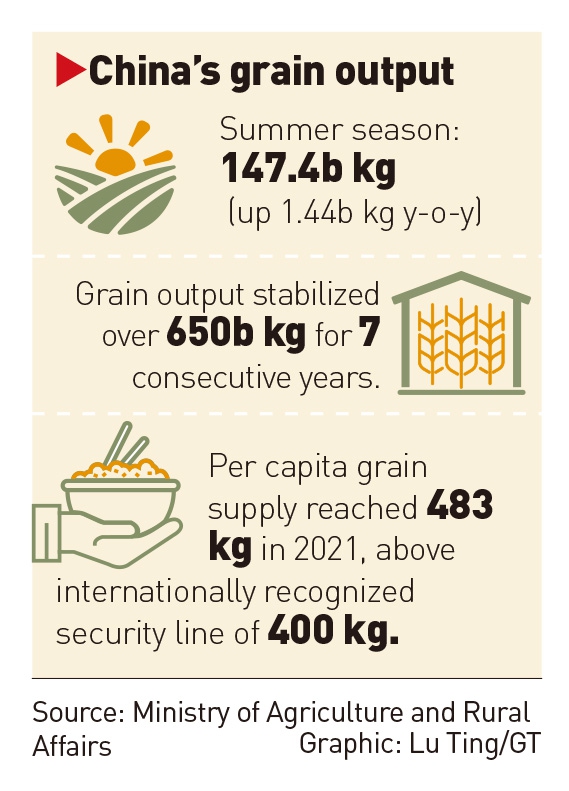
A harvester shuttles through wheat fields in Qingzhou City, east China's Shandong Province, June 7, 2022. China has reaped summer grain harvest with a 1-percent year-on-year growth in total output, the country's statistics bureau said Thursday. (Photo: Xinhua)
China's summer grain output reached a record high in the first half of the year, which experts said has laid a solid foundation for a good yearly harvest and played a positive role in stabilizing China's economy and contributing to global food security.
China's summer grain output hit 294.8 billion jin (147.4 billion kilograms), a record high, an increase of 2.87 billion jin over the previous year, despite challenges like extended autumn flooding, the pandemic and rising costs, the Ministry of Agriculture and Rural Affairs (MOA) said on Wednesday.

Wheat production rose 2.57 billion jin to reach 271.5 billion jin. The increase of wheat output is a highlight of the country's agricultural sector, which has been contributing to economic and social development this year, Zeng Yande, an official with the MOA, said during a press conference on Wednesday.
And, soybean planting area has grown while the planting area for rapeseed totaled more than 100 million mu, with a record-high yield.
"The key to achieving a full-year harvest depends on coming autumn harvest, which accounts for 75 percent of annual grain production," Zeng noted, adding that this year's fall grain area is expected to exceed 1.3 billion mu.
Food security has become a global concern amid the pandemic and a string of geopolitical challenges, which affected global agricultural production and supply of agricultural products.
China's elevated grain output and near self-sufficiency is a boon for global food security, Jiao Shanwei, editor-in-chief of industry news website cngrain.com, told the Global Times on Wednesday, adding that some Western media hype about China hoarding grain and causing a shortage in grain supply is nonsense.
The Chinese people have held their own rice bowls firmly in their hands for a long time, experts say.
China had a bumper grain harvest in 2021, despite extreme weather and COVID-19. The nation's grain output was stable at over 1.3 trillion jin for seven consecutive years as of 2021 and the per capita grain supply hit 483 kilograms, higher than the internationally recognized safety line of 400 kilograms, according to the MOA.
"Based on its own domestic resources, China has successfully addressed the problem of feeding one-fifth of the world's population, which in itself is an important contribution to global food security," Zeng said.
While actively solving its own food problems, the Chinese government is contributing to safeguarding international food security.
At the 9th China-EU High-Level Economic and Trade Dialogue on Tuesday, both sides agreed to increase cooperation in the fields of global food and energy security, and jointly promote global economic and financial stability.
It is expected that there will be more opportunities for China and Europe to complement each other's advantages in grain trade, Jiao said.
"Europe mainly imports non-GM soybeans and cereals from China, and China mainly imports wheat and feed grain from Europe, so there may be more opportunities for enhancing cooperation," Jiao said.
In addition, both sides could carry out cooperation in third countries to help with global food security, Zhou Rong, a senior researcher at the Chongyang Institute for Financial Studies of Renmin University of China, told the Global Times on Wednesday.
"For example, China can carry out mutually beneficial cooperation with the EU through international organizations. The EU can provide farming technology while China has successful experience to adapt to developing countries," Zhou said.
Food cooperation between China and the EU is beneficial to all mankind and serves as an opportunity to boost China-EU economic and trade ties, Zhou said.
Since the outbreak of the pandemic, some countries have taken measures to restrict the export of food, which has had negative impact on global food security, Zeng said, noting that the Chinese government has responded vigorously and taken effective measures to ensure stable domestic food supply.
China actively fulfills its international responsibilities, helping the majority of developing countries improve agricultural production and food security through agricultural South-South cooperation, and multilateral and bilateral food aid programs.
Since the beginning of this year, China has provided more than 15,000 tons of emergency humanitarian food aid to developing countries in need, said Chinese State Councilor and Foreign Minister Wang Yi at the G20 foreign ministers' meeting on July 7, Beijing Daily reported.
China is the country that has donated the most funds and sent the largest number of experts to the Food and Agriculture Organization of the UN, focused on South-South cooperation, Zeng said.
"As both China and the US are major agricultural countries, they should play an active role in jointly maintaining global food security. Since last year, China and the US have had good interaction in the sector, with both sides communicating on cooperation to enhance food security," Zeng said.





